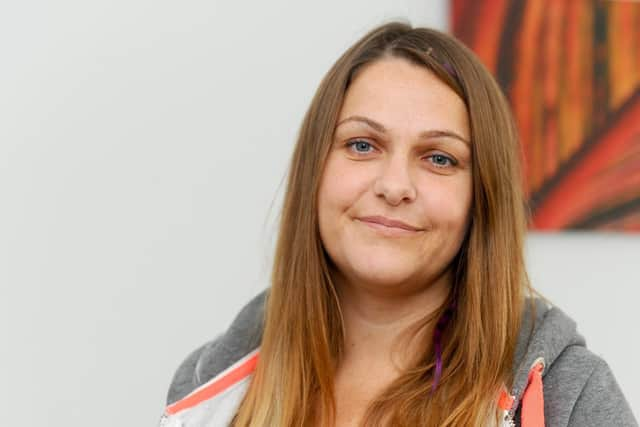Mum of two shares her experiences of living with Lyme disease to raise awareness and funds for £6,000 treatment


Now hoping to raise awareness of the illness and funds for private treatment, mum-of-two Laura Harris has shared her experience since being bitten by a tick around 25 years ago on a Guide camp in the New Forest, and again in the Alver Valley around 15 years ago.
The classic bullseye rash associated with tick bites never appeared on Laura, so the ex-drug and alcohol worker could not be tested for Lyme disease on the NHS, even as she began to struggle with mental processing and was medically discharged from work.
Advertisement
Hide AdAdvertisement
Hide AdThe 39-year-old said: ‘I was really suffering, I’d get home and I’d just fall on the floor. My memory was getting worse and worse. I don’t feel I have quality of life, there’s moments of it of course but overall it’s not.


‘When I wake up I feel like I’ve not been to sleep for days. I’m constantly walking around feeling that I’m pulling my body and it’s exhausting just trying to get up sometimes. Most of the time I sleep too much but I go through periods of insomnia too.’
After years of misdiagnoses and living with frequent periods of flu-like symptoms, throat infections and joint pain, Laura listened to Yolanda Hadid’s audiobook Believe Me - My Battle with the Invisible Disability of Lyme Disease and cried the whole way through as she related to the story so much.
As the NHS does not test for Lyme disease more than eight weeks after a tick bite, Laura had to fund £3,000 tests at Breakspear Medical in Hertfordshire, where she hopes to receive treatment for her diagnosis of Lyme neuroborreliosis - meaning it has hosted itself in her brain.
Advertisement
Hide AdAdvertisement
Hide Ad

Mum-of-two Laura has been juggling dealing with her illness alongside caring for her children and has found it hard at times.
She said: ‘I was referred to the memory clinic as they were questioning early onset dementia.
‘I would get my children to school, come home, set my alarm, sleep all day until they came home, so I could then stay up with them until they went to bed.’
Laura is on a mission to raise public awareness of symptoms of Lyme disease as well as raising more than £6,000 to fund her treatment.
Advertisement
Hide AdAdvertisement
Hide Ad‘It’s such a terrible illness that’s unnecessary if it’s diagnosed and treated properly. People don’t need to be living like this,’ Laura told The News.
‘I’m trying to prevent other people from living with it this long. At the moment they can’t cure it, I’m probably not going to be what I was at my best but I have got a chance of it not getting worse and reversing some of the damage.
‘It’s a bit of a lonely path, at times I feel like I’m navigating the road myself. If I can get it spotted in children and prevent it getting worse into adulthood, that’s my aim.’
A lot of people don’t even know they’ve been bitten because the ticks are so small, and Lyme disease is known as ‘the great imitator’ as it resembles symptoms from Parkinson’s, Alzheimer’s, fibromyalgia and chronic fatigue syndrome.
Advertisement
Hide AdAdvertisement
Hide AdLaura added: ‘Follow your instincts, if you know something isn’t right don’t get fobbed off. It’s so important that people listen to their body.’
Laura recently received support from Solent Metal Detecting Club as they presented her with a £350 cheque raised by members donating a percentage of their joining fee.
To make a donation towards Laura’s treatment fund and read more about her story, visit justgiving.com/crowdfunding/laura-harris-5.
Lyme Disease UK offers lots of resources and factual information. For more information, visit lymediseaseuk.com.
Advertisement
Hide AdAdvertisement
Hide AdA GP toolkit and a free e-course for health professionals is available through the Royal College of General Practitioners in association with Lyme Disease Action.
What is Lyme disease?
Lyme disease is a bacterial infection that can be spread to humans by infected ticks, caused by Borrelia, a spirochete bacteria.
It’s the most common tick-borne infectious disease in the northern hemisphere, although not all ticks carry the disease.
Annual numbers of new cases in the UK are usually between 2,000 and 3,000 but research published in online journal BMJ Open suggest it actually may be three times higher than previous estimates suggest, and might top 8,000 in 2019.
Advertisement
Hide AdAdvertisement
Hide AdLyme disease can be contracted in many parts of the United Kingdom, particularly in woodland areas but cities and gardens can also host disease-carrying ticks.
Many people with early symptoms of Lyme disease develop a circular red skin rash around a tick bite, known as a bullseye rash.
This usually appears in the first four weeks but it can appear up to three months after being bitten and usually lasts for several weeks.
Not everyone with Lyme disease gets the rash. Some people also have flu-like symptoms in the early stages, such as a high temperature, headaches, tiredness and muscle and joint pain.
Advertisement
Hide AdAdvertisement
Hide AdIf your GP thinks you might have Lyme disease, they'll prescribe a three-week course of antibiotics, and some people with severe symptoms will be referred to a specialist in hospital for injections of antibiotics.
How to reduce risk of tick bites:
To reduce the risk of being bitten, the NHS advises people should cover their skin while walking outdoors and tuck trousers into socks.
Also, when out and about people should use insect repellent on clothes and skin – products containing DEET are best.
Stick to paths whenever possible and wear light-coloured clothing so ticks are easier to spot and brush off.
Advertisement
Hide AdAdvertisement
Hide AdIf you are bitten by a tick, it is important to remove it as quickly as possible with tweezers or preferably one of the tick removal tools, so the head doesn't get left in and the chance of transmission increased.
Some ticks can be as small as a poppy seed and so it can be very easy to miss a bite, alongside the fact that they don't hurt, as the tick injects an anaesthetic.
If you have been bitten and experience a bullseye rash or flu-like symptoms, make an appointment with your GP.
